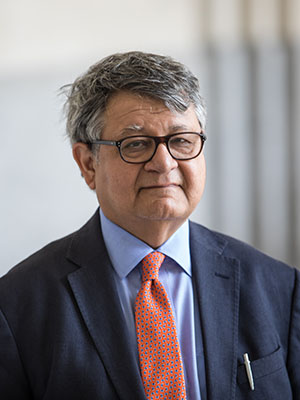
Rajiv Kumar, an eminent economist, took over as vice chairman of Niti Aayog in August 2017 after the then VC Arvind Panagariya exited the government think-tank to return to academics.
ANNOUNCING THE resignation of NITI Aayog Vice-Chairperson Rajiv Kumar, the Centre appointed economist Suman K Bery to the post on Friday. Kumar will step down on April 30, marking the second successive resignation from the post since the formation of the government think-tank in 2014. Kumar had taken over in August 2017, replacing Arvind Panagariya who resigned from the post to return to academics. While Bery will join the organisation with immediate effect, he will assume the role of Vice-Chairperson from May 1, said a government order released late on Friday. Bery is a former Director General of the National Council of Applied Economic Research (NCAER), a position he held for a decade from 2001 to 2011. He also served as a member of the Prime Minister’s Economic Advisory Council, the Reserve Bank of India’s Technical Advisory Committee and the National Statistical Commission.
Prior to NCAER, Bery was with the World Bank in Washington DC and his areas included macroeconomy, financial markets and public debt management with a focus on Latin America. He did his undergraduate studies at Magdalen College, Oxford University, in Philosophy, Politics and Economics and holds a Master’s in Public Affairs (MPA) degree from the Woodrow Wilson School of Public and International Affairs, Princeton University.
In August 2017, days after he was named NITI Aayog Vice Chairman-designate, a column written by Rajiv Kumar appeared in Hindi daily Dainik Jagran, where he called out the foreign influence on Indian policy-making by Indian-American economists, and said this was fading at the time with the resignations of Raghuram Rajan as RBI Governor and Panagariya as NITI Aayog Vice-Chairman. He wrote that even as the love for foreign goods declined following the 1991 liberalisation of the economy, it took a long time for the country’s policy-making establishment to get rid of the “Macaulayist mentality”.In August 2019, taking cognizance of the bad liquidity situation in the financial sector and weak private investment in the economy, Kumar had said that since the government was faced with an “unprecedented issue”, it needed to take steps that were “out of the ordinary”. He said the government needed to take measures that eliminated the distrust in the private sector players and encouraged them to raise investments.
Kumar holds a DPhil in Economics from Oxford and a PhD from Lucknow University. He also served as the Chancellor of Gokhale Institute of Politics and Economics, Pune, and Chairman of the Board of Governors of the Giri Institute of Development Studies, Lucknow. He earlier served on the central boards of State Bank of India for two terms and on the central board of the RBI.